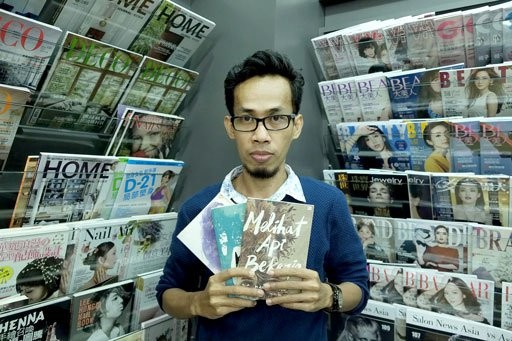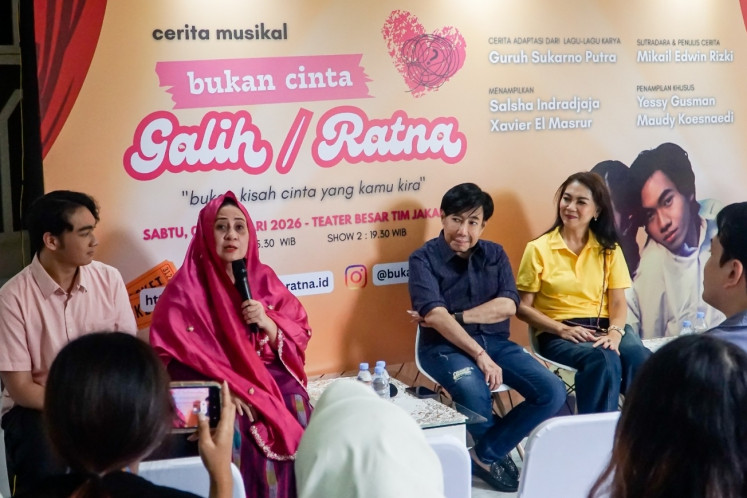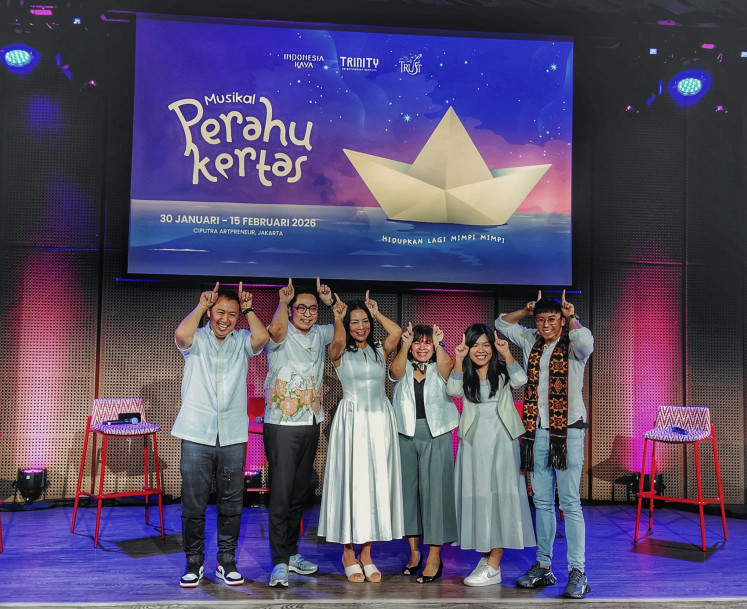Popular Reads
Top Results
Can't find what you're looking for?
View all search resultsPopular Reads
Top Results
Can't find what you're looking for?
View all search resultsAan Mansyur: All poems are love poems
Change text size
Gift Premium Articles
to Anyone
Writer Aan Mansyur exposed himself to literary books when he was very young and found his passion later in his life.
Love changed the path of time/Because of love time divided into two/With you and the longing to reverse the past….
That was a line of a poem read by Rangga (played by Nicholas Saputra) in the sequel to Ada Apa Dengan Cinta? (What’s Up With Cinta?). Back in 2002, the box office hit inspired youngsters to read poems. Teens wanted to be as cool as Rangga and Cinta, the iconic characters who shared a similar passion for poetry.
In the movie’s sequel, poetry remains an important color of the film. Movie producer Mira Lesmana and director Riri Riza from Miles Productions asked Makassar writer Aan Mansyur to write some poems for the sequel.
“I gained full liberty in creating the poems. Even when there was need to cut some lines during production, they asked and consulted me first. I consider this as a collaboration,” he said.
After some thorough research in books, on social media, in pictures and with people who have experience living in New York, Aan finally created 31 poems.
“Four to five poems, I’m not really certain, were exposed in AADC 2. How they chose and used them was completely the privilege of the movie director and his team.”
All 31 poems were published in a poetry collection book entitled Tidak Ada New York Hari Ini (No New York Today).
“I imagined a big idea that spreads into some poems. My poems don’t stand alone, but as a unity of an idea,” said the graduate from the School of Letters at Hasanuddin University.
Even though Ada Apa Dengan Cinta 2 tells the love story of Rangga and Cinta, Aan’s poems aren’t always about love.
“I tried to figure out things inside the mind of a person like Rangga, inside his heart, the books he read, people he mingled with and how it was to long for his home country.”
However, he admitted, “All poems are love poems.”
Aan’s published books are 2005’s Hujan Rintih-rintih (Moaning Rain), 2007’s Perempuan, Rumah Kenangan (Woman, Memorable Home), 2007’s Aku Hendak Pindah Rumah (I Am Moving Out), 2008’s Cinta yang Marah (Angry Love) and 2015’s Melihat Api Bekerja (Looking at the Working Fire).
Besides those, he has also written many children’s stories that have been published in a number of newspapers.
Looking back, Aan said he might not have had an exciting childhood, but it played a great role in shaping his career choice to be a writer. He had a disease that made him get tired easily.
“My little brother used to play outside with the cows, going around the paddy fields. Meanwhile, I stayed home reading my grandfather’s books, which definitely were not for young readers.”
By the fourth grade, he had already read Buya Hamka’s books and some of Pramoedya Ananta Toer’s in the Malay language, such as Keluarga Gerilya [Guerilla Family].
“This has made a strong foundation for me as a writer,” he added.
Aan, a self-confessed introvert, revealed that he was close to his grandmother, who would tell him a bed-time story every night.
“She always had an answer for my curious questions and delivered it through stories. For example, when I asked about the history of our village, Desa Biru, she told me this story that once a piece of the blue sky fell down to the Earth and turned into a village and so on,” he said.
The stories inspired him to rewrite them to be sent to some mass media and a pen pal.
His young writing skill was further sharpened by a habit of communicating with his mother through letters, even though they lived in the same house. His mother worked in a small market in the village. If Aan asked her to purchase something for him or wanted to convey something, he wrote it in a letter and put it under his mother’s pillow.
“Likewise, when mother decided to agree or disagree to my request, she would reply in a letter and then put it back under the pillow. The day after, I would read it,” Aan said.
During his teenage years, Aan was curious about his first name and asked his grandfather to explain it. His grandfather simply replied that he would find the answer to that question in As’adiyah Islamic School and so he went to the Islamic school located in Sengkang city, also in South Sulawesi.
“Eventually I learned that my name came from the school’s founder, Muhammad Yunus Martan. My name is Martan Mansyur, before I twisted it into M. Aan Mansyur.”
Tired with its teaching method, Aan quit the Islamic school after a year and continued his education in a public high school where he actively wrote and sent his articles to various youth magazines.
Yet he hadn’t decided to become a writer. He did it merely for the money he used to pay the tuition and writing was the only skill he knew. After high school, he spent most of his time reading books in libraries. A year later, he enrolled in the English department at the School of Letters in Hasanuddin University.
Around the year 2000, Aan decided to craft a career in writing.
“I became more aware that writing was my passion and the only I thing I could count on.”
Since then, he took to writing seriously by burnishing his writing skills.
“I read repeatedly the books I love. I also retyped or rewrote them. One of them was Bumi Manusia [This Earth of Mankind] by Pramoedya. I wanted to sense and experience the feeling of the author when he created it,” he said.
As a librarian, Aan sees every book like a human being that has his or her own character.
Writing, he said, is not merely about crafting words, but is more about the thinking process.
“I don’t write for conveying messages. One of the reasons I dropped out of As’adiyah was because I was tired of being preached to,” he said, adding that he gave his books’ readers space to find their own versions of truth.
At the moment, Aan resides in Makassar, managing a small self-owned library he named “Katakerja”, which serves as a place for people to meet up, open dialogues and build networks.











